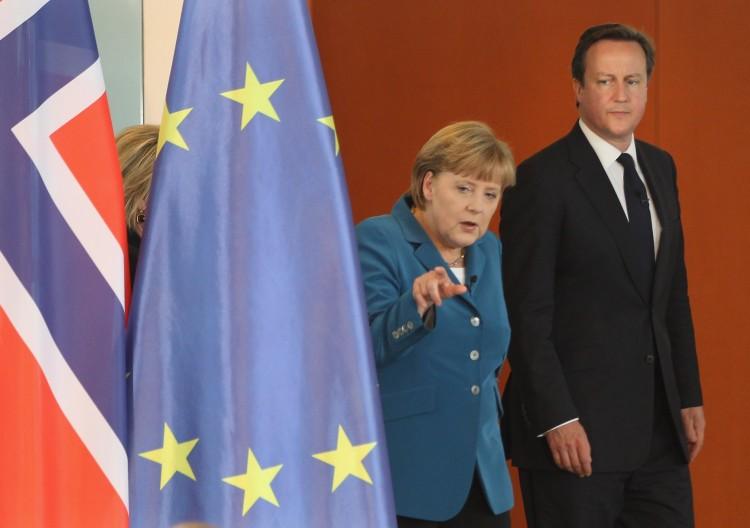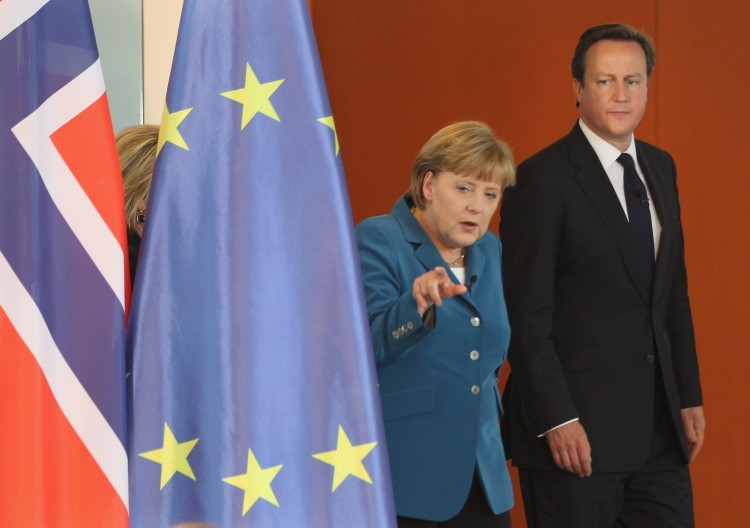MUNICH—The eurozone’s crisis is escalating, as Spain was next in line to apply for 100 billion euro ($125 billion) bailout last week. Investor confidence is falling as global markets nervously await the fate of the euro currency.
All eyes are on Germany and in particular on Chancellor Angela Merkel, who has yet to propose a clear euro strategy. Talks about a banking union (EU-wide deposit insurance, joint recapitalization of failing banks, bank oversight system, and EU government bonds are among the discussed aspects) is getting louder and louder.
More politicians are seeing it as the only way to save the euro. Harsh austerity programs seem not to be the only necessary ingredient in the mix to bring stability and put the EU economy back on its feet as a whole.
The idea of a banking union is a double-edged sword. On the one side it would add tremendous agility, strength, and flexibility to the European banking system.
If some banks fail, the others would immediately replenish the loss with fresh liquidity, thereby rebalancing the whole EU banking system.
Borrowing money would be just as easy for the failing banks as for the best rated. Crises like those that struck Greece, Portugal, Ireland, and Spain could be avoided or easier prevented before they get too serious.
On the other hand, a banking union could diminish responsibility and discipline of the failing banks and countries, as there would not be the harsh consequences of bankruptcy. Austerity programs would not be taken seriously, and it would make it easy just to borrow “some more money” in case of a big budget deficit. It would also dampen competition within the EU and could indirectly spur corruption, as banks and governments would not be as liable and closely watched by the rest of the world in case they don’t perform up to par.
To address the negative side effects of a banking union, a necessary security mechanism must be put in place to oversee all banking activity and to make sure that all banks are aligned in their financial operations and execute according to strategy. The banking union would have to form a centralized EU-wide financial transparency and tax control mechanism for each member state to avoid such cases of “cooking the books” and tax evasions like the ones experienced in Greece.
“We need more Europe—not only a monetary union, but we also need a so-called fiscal [banking] union, in other words more joint budget policy,” said Angela Merkel in a recent speech. “And, most of all, we need a political union, meaning we need to gradually give competencies to Europe and give Europe control.”
Merkel is of the opinion that European Commission needs more power through the banking union “otherwise a currency union cannot work,” she said.
Forming the banking union would also entail better political integration, according to Merkel. In other words, it would be something like the United States—one country with various states, but with one government, constitution, central bank, and a system of banks reporting to a set of regulators.
Angela Merkel is more comfortable proposing the banking union idea to non-Germans than domestically. Most Germans are against the idea of a banking union, because they are the ones who must carry the rest of EU on their shoulders.
“If everyone is liable for everyone else, that leads to carelessness,” cited the popular German newspaper Bild. “And in the end, someone has to foot the bill—under the current scenario: German banks and, in the end, German savers.” The idea of a banking union reminds many Germans of a big social welfare state, where hardworking and overtaxed Germans are supporting the laggard countries.
Besides Germans, Britain, who is not a member of the eurozone, is also fiercely against a banking union and any additional transaction taxes. It is reluctant to acknowledge any restrictions and taxes to its vast financial sector, which comprises 10 percent of U.K.’s GDP.
“I have no doubt that eurozone countries want deeper integration,” said British PM David Cameron, in Berlin last week during his meeting with Merkel. “But Britain will not participate in this integration.”
But the German chancellor was determined to push forward with the plan, in her speech last week.
“We already have in certain areas . . . a quasi two-speed Europe,” she said in an interview with “German Breakfast Television,” referring to the Schengen borderless travel area and the single currency block.
“That will increase. Whoever is in a currency union will have to move closer together. We have to be open about this, and make it possible for all to participate, but we cannot stand still just because one or another [country] doesn’t want to come along,” she added.
Whether the idea of a banking union materializes still largely depends on upcoming events such as the June 17 elections in Greece and further developments in Spain, the fourth biggest EU economy that is about to receive its first bailout.
The Epoch Times publishes in 35 countries and in 19 languages. Subscribe to our e-newsletter.






